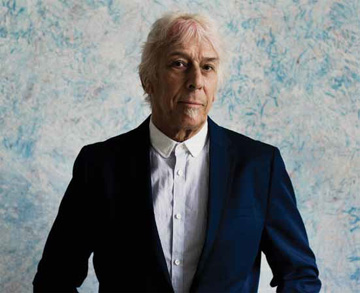The Shifty Adventures of John Cale

For many, March 9 will forever live in infamy as the anniversary of Notorious B.I.G.‘s murder. Others know the same date as John Cale’s birthday – he celebrated his 70th this year. At first, these two landmark moments in music history were purely cosmic. But the degrees of separation between the former Velvet Underground member and the hip-hop world have come closer after the release of Cale’s outstanding new album, The Shifty Adventures of Nookie Wood, which finds him putting down his trademark viola and avant-classical tendencies in favor of an Akai MPC, Auto-Tune and a collaboration with Danger Mouse that belies his 50 years as one of rock’s most artful dodgers. It is easily the Welshman’s most impressive and enjoyable work as a solo artist since Music for a New Society, and one that will hopefully familiarize his name for a new generation whose grandparents might have caught him with VU at Andy Warhol’s Exploding Plastic Inevitable.
What inspired the more hiphop oriented direction of your new album and your use of the MPC?
I decided to try a different route during this album. It helped me get further down the line with a tune. Once you got the groove going, you put the chords on top of it. You move along and it’s easier to spot where you need bridges and where you need choruses.
When did you first get into hip-hop?
About four years ago, actually. I started getting into Snoop Dogg when he hit with “Drop It Like It’s Hot.” Pharrell’s production on that song is spectacular.
Do you like Dr. Dre as well?
Oh, yes. Definitely. But the thing I’m really affected by is Eminem in that song where he pays tribute to Dre ( “I Need a Doctor” ). Where Eminem says, “You risked your career for me/ I know it as well as you/ Nobody wanted to fuck with the white boy/ That’s why I’m crying in this booth/ You saved my life, now maybe it’s my time to save yours/ But I can never repay you/ What you did
for me is way more.” I mean, he’s a hero.
What new hip-hop are you into?
I like Wale from D.C. That guy is really interesting in terms of his concept of what hip-hop beats are supposed to be. He was using bits of string quartets, turning them into loops and then
rapping on top of that. And there is very warm and nice imagery in his songs – not quite so much about the game and violence. I like the guys that are funny. There’s also a group called Not the 1’s and they have a song titled “You Dress Like an Asshole.” [Laughs.] It’s great. It’s really great.
Do you have any plans to reissue your back catalog?
Yeah, in due course. We are trying to figure out the best way to do it. I haven’t looked at those tapes in so long. It’s all in storage. I have to dig through it. It’s in the works; it just needs to be done because the record company is asking for it.
How did you wind up getting Lowell George, Bill Payne and Richie Hayward of Little Feat to play on Paris 1919 ?
I loved that album Dixie Chicken. That tone on [George’s] guitar was very sweet. It was the grooves that he had. And after playing me an early cut of that record, [producer] Ted Templeman at Warner Bros. said to me: “Why don’t you use Little Feat as a backup band for Paris ?” He organized it.
It’s surprising that while you, Lou Reed, Moe Tucker and Doug Yule all went on to enjoy careers as solo recording artists, the late Sterling Morrison did not. Why is that?
He got so pissed off in general that he decided he wanted to strictly focus on his teaching mission in Austin, Texas. That’s it – though he would sit in with local bands from time to time, and he did some recording with me, Lou and Moe as well.
What is your favorite memory of Sterling?
Whenever I got into a fight with Lou, Sterling was there. And he would always say to him, “You know, Lou, you may be smart but you’re not as smart as you think you are.” [Laughs.] He had a great sense of humor. He was a lovely guy.



















